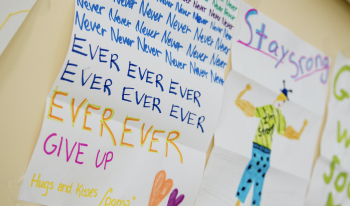I know some people who had a daughter that was born prematurely. It was touch and go for a while—she spent a month in a neonatal intensive care unit (NICU)—but, because of the great care she received, she grew up and—in the process—became a wonderful young woman.
Periodically, and especially on her birthday, her family often recalled the amazing care and caring they all received in that NICU. On her 21st birthday, she and her parents had the great idea to include the nurses in the celebration. They took a birthday cake to the NICU to share with them. Some who had cared for her as a preemie were still working there, and the family had a grand time reacquainting themselves as well as meeting those who were newer to the unit. The nurses enjoyed sharing the upgrades in equipment and technology that had happened since her stay in the NICU 21 years ago.
When the cake had been eaten, the family thanked the nurses for what they had done—and what they continue to do—in helping small babies on their journey to health. The nurses thanked the family for their kindness in remembering them on such a special occasion, but insisted they were just doing their job. Farewells were said, the family left, and the nurses went back to the bedsides of the infants in their care.
And that was it.
But it didn’t have to be. You see, had these nurses understood how to respond appropriately to the deep gratitude the family expressed, this story may have had a different ending.
The natural response to a heartfelt expression of gratitude is, “Don’t worry about it” or, “I’m just doing my job.” Sometimes, nurses may feel sheepish about gratitude extended to them. They don’t understand it because their work is just what they do. But from a patient or family member’s perspective, their work creates experiences that are often life changing. As one outspoken patient who went on to become a donor shared with us, “They’re like, ‘I do this all day, every day.’ You want to shake them and say, ‘Do you realize what you did for me?’”
Nurses are the greatest untapped resource for philanthropy in any healthcare organization because they are the people who spend the most time with patients and families. They are the ones who hold patients’ hands at two o’clock in the morning, who sit with people when they cry, who allay fears. Nurses are the people who interpret what’s going on with all the technology and equipment used to help their patients. They interpret what the doctor says and what that means for quality of life for their patients.
Nurses are busy, focused people. They are all about the quality of care they provide—it’s the most important thing. Nothing should come between them and the care they provide for patients and families. For many, philanthropy is a big unknown, and many may have misconceptions: If I’m thinking about philanthropy, how can I possibly be providing the best care? Will I have to determine whether this patient or their family has the means to make a contribution? What if I offend someone? And, most unsettling—Will I have to ask for money? Yet, once they understand what meaningful philanthropy is all about, nurses will recognize that all they have to do is change their perspective—from seeing philanthropy as an impediment to care to seeing it as another way to continue their care.
When a patient leaves the hospital, regardless of the medical outcome, it could signal the end of an important, caring relationship. Nurses can continue the care—and continue the relationship—by recognizing expressions of gratitude for what they truly are and opening the door for patients or family members who express a desire to be philanthropic, whether via contributions, volunteering, or serving in other ways. When a patient or family member offers a heartfelt “thank you,” nurses can and should accept it—as one doctor put it, it’s “free therapy,” after all. Then, if appropriate, they can extend the offer to connect them with their foundation for further discussion about what, if anything, the patient or family might like to do.
What might have happened in that NICU had the nurses been trained in philanthropy? We can’t know for sure. But what we do know is that the family went on to provide philanthropic support to other NICUs at other healthcare organizations. Nurses can be an incredible resource in strengthening the culture of philanthropy—it just requires a change in perspective.
Are you interested in providing valuable training for nurses and others who provide bedside care at your organization? Contact us to learn more about our workshop, Continuing the Care.


